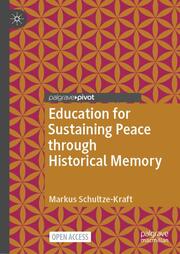Detailansicht
Education for Sustaining Peace through Historical Memory
Memory Politics and Transitional Justice
ISBN/EAN: 9783030936532
Umbreit-Nr.: 3100066
Sprache:
Englisch
Umfang: xi, 119 S., 1 farbige Illustr., 119 p. 1 illus. in
Format in cm:
Einband:
gebundenes Buch
Erschienen am 13.02.2022
Auflage: 1/2022
- Zusatztext
- Informed by the author's long-standing work on violent conflict, peace and education in countries of the Global South, particularly Colombia, this open access book presents a comprehensive narrative about the relationship between peace education, historical memory and the sustaining peace agenda, advocating for the adoption of a new perspective on education for sustaining peace through historical memory. Education on and for peace in countries wrestling with, or emerging from, protracted violent conflict is up against major challenges, and both conventional and critical approaches to peace education are limited to address these. Incorporating a focus on historical memory, without losing sight of its own pitfalls, into peace education can support learners and teachers to come to grips with achieving positive, peace-sustaining change at both the micro (individual) and macro (social and institutional) levels, and to develop concepts and practices of effective and legitimate alternatives to violence and war. Conceived in these terms, historical memory-oriented peace education also stands to enhance the work-in-progress that is the UN-led sustaining peace agenda, including its Sustainable Development Goals.
- Kurztext
- 'This is a necessary exercise in deconstruction and reconstruction that challenges conventional and critical approaches to peace education. Schultze-Kraft's new book is an impressive piece of synthesis, a personal manifesto married to a rigorous interrogation of the theoretical literature. It pushes boundaries enhancing the sustaining peace agenda. As such it deserves the critical attention of policy makers at the highest level, as well as scholar-practitioners.'-Paul Arthur, Professor of Politics, Ulster University, UK 'This impressive and valuable book delves into the intricacies, shortcomings and potential of historical memory-based approaches to peace education, unafraid of the tough questions and knowledgeably embracing complexities. Schultze-Kraft's advocacy of the memory culture approach to sustainable peace pedagogy will be of great value to educators and researchers not only in Colombia but also in other countries and regions emerging from violent conflict.' Eckhardt Fuchs, Leibniz Institute for Educational Media Georg Eckert Institute, Germany 'SchultzeKraft vigorously addresses the concepts and practices of, and political debates on, historical memory in the midst of violent conflict, enabling us to respond to key questions about the transition to peace: how to reconstruct traumatic pasts, how to narrate them, how to process them and how to transmit them to new generations with pedagogical purposes. Offering an exploration of tools for the empowerment of communities and for the elaboration of public policies to turn the aftermath of violent conflict into an opportunity for social transformation, researchers, conflict resolution practitioners and educators will find this book particularly helpful.' Gonzalo Sánchez G., Former Director of the National Historical Memory Commission, ColombiaInformed by the author's longstanding fieldwork in the Global South, this open access book presents a comprehensive narrative about the relationship between peace education, historical memory and the sustaining peace agenda, advocating for the adoption of a new perspective on education for sustaining peace through historical memory. Peace education in countries wrestling with, or emerging from, violent conflict is up against major challenges. Incorporating a focus on historical memory into peace education, without losing sight of its own pitfalls, can support learners and teachers to achieve positive change at the individual as well as social and institutional levels. Historical memoryoriented peace education stands to enhance the UNled sustaining peace agenda and the SDGs. Markus Schultze-Kraft is Professor of Political Science at the Berlin School of Economics and Law, and Arnhold Associate at the Leibniz Institute for Educational Media Georg Eckert Institute, Germany
- Autorenportrait
- Markus Schultze-Kraft is Professor of Political Science at the Berlin School of Economics and Law, and Arnhold Associate at the Leibniz Institute for Educational Media Georg Eckert Institute, Germany
